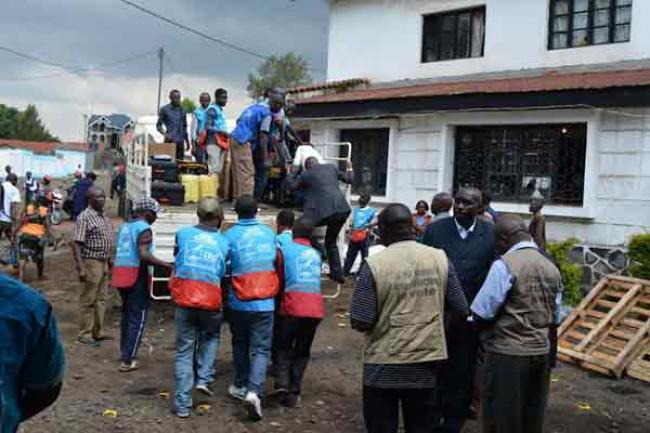Just Earth News 20 Dec 2016, 06:06 am Print

MONUSCO/Alain Wandimoyi
According to the Office of the UN High Commissioner for Human Rights (OHCHR), DR Congo has seen a wave of protests expressing concern that President Joseph Kabila will refuse to step down from office on Monday (19 December) when his second and final term under the current constitutional arrangements come to an end. Elections to replace him have been delayed until 2018.
“The targeted repression of dissenting voices of civil society and human rights defenders is contrary to democratic principles […] If civil society is not allowed to exercise the rights of freedom of expression, freedom of association and peaceful assembly, protesters will inevitably resort to violence, for which only the authorities are to be blamed,” warned a group of UN human rights experts.
These measures have most recently affected the citizens’ movements Lucha and Filimbi, both young citizen movements aiming at promoting political participation, which recently launched a public awareness campaign calling for respect for the Constitution.
On 1 December, five Lucha members and a journalist were arrested in the vast country’s eastern Ituri province while they were preparing a press conference to launch the campaign. The journalist was later released, but the other five are still in detention facing jail for alleged incitement of misconduct toward the authorities.
On Saturday, the UN High Commissioner for Human Rights, Zeid Ra’ad Al Hussein had also expressed deep concerns over the situation in the country and called on the authorities, in particular the security forces, “to take all necessary measures” to guarantee the rights to freedom of association and of peaceful assembly.
Furthermore, according to reports, DRC authorities have also ordered all Internet Service Providers (ISPs) to block access to socialmedia websites. The block was planned to be enforced from Sunday evening.
“A measure of this broad scale suppresses the right of the people of DR Congo to access information and to communicate. This right is particularly essential during times of public debate and democratic choice,” the experts underlined.
The human rights experts raising their concern included:
· Maina Kiai, UN Special Rapporteur on freedom of peaceful assembly and of association
· David Kaye, UN Special Rapporteur on the promotion and protection of the right to freedom of opinion and expression
· Michel Forst, UN Special Rapporteur on the situation of human rights defenders
Independent experts and Special Rapporteurs are appointed by the Geneva-based UN Human Rights Council to examine and report back on a specific human rights theme or a country situation. The positions are honorary and the experts are not UN staff, nor are they paid for their work.
- Ali Khamenei (1939–2026): Iran’s Supreme Leader who ruled with an iron grip
- Trump signs 10% global tariff, says it takes effect ‘almost immediately’
- BJP wins a seat in Bangladesh — But not the one you think!
- Meet Shabana Mahmood: Could she take over as UK’s first Pakistani-origin Muslim PM?
- Dalai Lama's Office breaks silence on Epstein claims





-1763561110.jpg)
